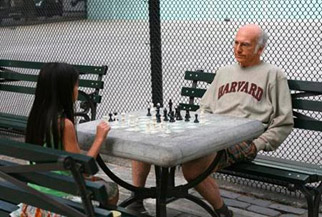|
|
Movie Review: Whatever WorksBy Matthew HuntleyJune 29, 2009
The chaos doesn't stop. Marietta (Patricia Clarkson) is Melodie's neurotic mother who comes to New York after her husband cheats on her. Soon after a couple of dates with a couple different New Yorkers, the once conservative, devout Marietta discovers she has a taste for photography and starts fulfilling some erotic fantasies. The same goes for Melodie's father, John (Ed Begley, Jr.), who also finds a different kind of lifestyle better suits his needs. Ultimately, the movie is about people re-discovering the fundamentals of what makes them happy, no matter how unorthodox. If it works, it's enough. Allen's film has an obvious liberal veneer to it, but the bottom line is that it's riotously funny and entertaining, thanks mostly to David's quirky observations of mankind's flaws (my favorite was the line about public toilets). Allen obviously wrote a lot of himself into the character (he could be any number of Allen's characters from his previous films). It'd be interesting to see how long audiences would last if both Allen and David starred in the same movie. Talk about having a lot to bear. Along with its humor, what ultimately makes Whatever Works work is the ensemble cast and the time it takes to develop all its characters, including those who enter the story late. Allen's screenplay teeters between Boris' harsh perspective and the rest of the characters' transformations. The same way the film balances itself, it reminds us of the balance we need in our own lives and the dangers of being too outspoken and not outspoken enough. It's not always in our favor to be in the know, either. Throughout the film, Boris breaks the fourth wall and talks to the audience, which is something only he can do, but we don't necessarily consider this a gift. In the hands of a lesser director, a story like this might have turned into a mess, but I was impressed by how smoothly it all came together and how much it saw all its characters through with grace, wit and humor. The ending is a little simplistic, and Larry David is not a natural actor, but again, the movie is all about balance, and with that, what it may lack in some areas, it more than makes up in others.
|

|
|
|

|
Thursday, October 31, 2024
© 2024 Box Office Prophets, a division of One Of Us, Inc.


